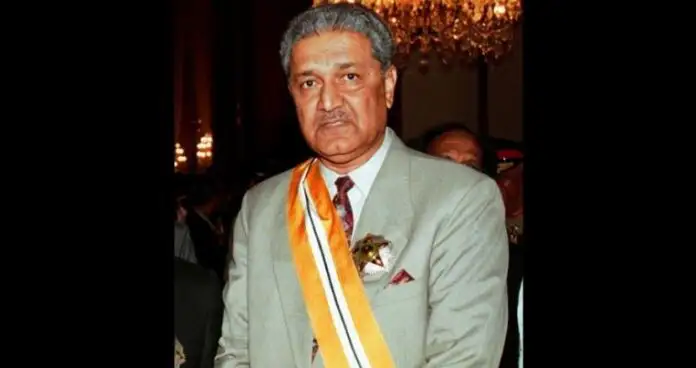Pakistan’s nuclear scientist Dr. Abdul Qadeer Khan passed away at the age of 85 on October 10, 2021. He was known as the father of the Pakistani nuclear program but then later accused of smuggling that same technology to North Korea, Iran, and Libya. Dr. AQ Khan was living under house arrest since 2004, on the orders of George W. Bush’s American government. He died in a hospital in Islamabad after being admitted there for COVID-19. The cause of death was reported as multiple lung problems.
The last letter of Dr. Khan surfaced after his death, in which he thanked the Sindh Government for remembering him in a difficult time. Reportedly, he sent this letter to the Sindh government on October 4. In the letter, he also complained about Imran Khan’s government which did not pay any regard to his ill-condition. Dr. AQ Khan said that ministers of Punjab, Baluchistan, and KPK were probably waiting for the “good news” of his death.
Imran Khan not Present at the Funeral of Abdul Qadeer Khan
In his homeland, Khan was hailed as a national hero who made the first Muslim majority country, a nuclear power. Whereas in the west, he was viewed as a villain. He was given a state funeral at Faisal Mosque in Islamabad before being laid to rest. His funeral received large attendance despite the heavy rainfall that day. According to reports, parliament members, cabinet ministers, and military leaders were among the attendees. However, Prime Minister Imran Khan was absent, due to which social media was highly critical of him.
Imran Khan only tweeted that he was “deeply saddened” by the death of Abdul Qadeer Khan, who helped Pakistan become a nuclear state and strengthen its position against a much greater nuclear neighbor.
The Most Dangerous Man According to CIA
For the last 50 years, Abdul Qadeer Khan has been the most significant figure in the global security scene. He was right in the middle of the battle for nuclear technology, between those who had it and those who didn’t. He procured blueprints for uranium centrifuges to transform uranium into weapons-grade fuel for fissile material. This contribution to Pakistan’s defense tangled him in a series of controversies that led the Central Intelligence Agency (CIA) to call him “Most Dangerous Man” and also compared him to Osama Bin Laden.
Dr. Khan was charged with stealing the nuclear blueprints from the Netherlands and bringing them back to Pakistan in 1976, while he was working for the Anglo-Dutch-German conglomerate, Urenco. On his return, then PM, Zulfikar Ali Bhutto placed him in charge of developing a uranium enrichment project. Khan announced in 1984 that Pakistan was able to detonate its first nuclear weapon. Then after the 1998 test in response to India’s, Pakistan received various sanctions from many countries which led to economic downfall.
In 2001, Upon increasing US pressure, Military dictator General Musharraf’s government started to dim the popularity of AQ Khan. First Musharraf removed him from the chairmanship of Kahuta Research Labs and then 3 years later put him under house arrest. He was even forced to confess live on TV in which he admitted to working with other countries regarding nuclear technology. He was released in 2009 but his movements were still strictly restricted. The country’s security agencies followed him around wherever he went.
The Nuclear Network
The complete picture about what Abdul Qadeer Khan did and how remained unclear. The only known information is that he established a large network with countries that the US considered as “rogue states”. From importing nuclear material, Pakistan started to also export it. Iran’s centrifuge program at Natanz, which was the reason for intense global negotiation, was mostly built due to the material and designs first supplied by Dr. AQ Khan. Reportedly, there was a proper catalog with a rate list for the customers to decide what to order.
Similarly, with North Korea, Khan made several visits to the country where he made deals with officials to exchange nuclear technology and missile expertise. Till that time, it was still not clear whether Khan was acting alone or on orders of the Pakistani government. However, after the NK deal, it was pretty much clear that his country was fully involved.
It was also not clear if Khan did all of that for money but some of the people in his network did prioritize only money. Some suggested that AQ Khan simply did to break the monopoly of western nuclearization. He saw it as hypocrisy and questioned why only some countries had such power and others don’t. In his defense, he said that he was not a madman and the west only hated him because he disrupted their “strategic plans” by empowering smaller countries.
Tracking The Doctor
CIA and British MI6 began tracking the movements of Abdul Qadeer Khan extensively. They poured a considerable number of resources to oversee his travels, intercept his phone calls, penetrate his network, and buy his allies to betray him.
Reportedly, on December 11, 2003, the hunting officers found a stack of about 5-6 brown envelopes in which they found the designs for an off-the-shelf nuclear weapon, supplied by Dr. AQ Khan. Reportedly, it was “handed to them” on board the plane when they were at the end of their clandestine operation in Libya that involved tense negotiations regarding the nuclear program.
After the events of 9/11, the CIA was already worried about such technology getting into the hands of the terrorists. Therefore, they continued to push Pakistan to take action against Abdul Qadeer Khan.
Also Read


